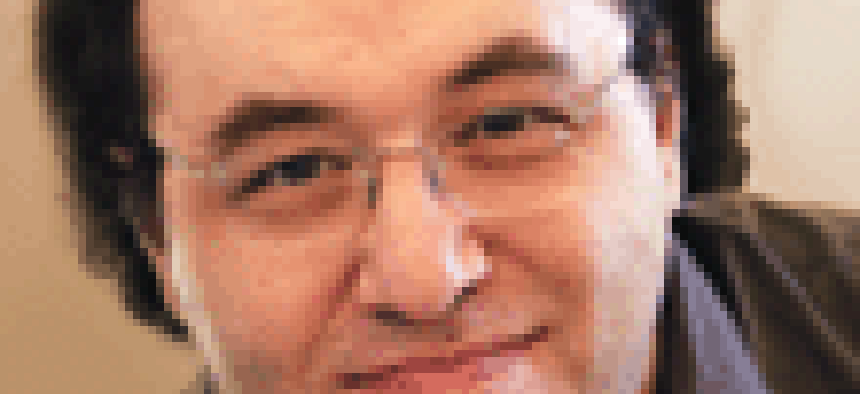Survival Guide: Stephen Wolfram, scientist and founder and CEO of Wolfram Research

Not everyone lays claim to inventing an new way of thinking scientifically about the world. Last year, Stephen Wolfram, who developed the popular technical computing software Mathematica, published a controversial book, "A New Kind of Science." An 1,192-page volume, the book shows how complex behavior can spring from a small set of initial rules. It draws from an emerging field of physics called cellular automata, or the study of how dynamic systems develop.
Not everyone lays claim to inventing an new way of thinking scientifically about the world. Last year, Stephen Wolfram, who developed the popular technical computing software Mathematica, published a controversial book, "A New Kind of Science." An 1,192-page volume, the book shows how complex behavior can spring from a small set of initial rules. It draws from an emerging field of physics called cellular automata, or the study of how dynamic systems develop. Instead of explaining complex natural phenomena through mathematical equations, Wolfram argued, we can understand such phenomena by using what he calls simple programs, or sets of rules that could be implemented in a few lines of computer code.While some scientists took offense at the book, others agreed with Wolfram, finding new insights into their own work through his ideas. Even Congress took notice. On Sept. 4, Wolfram spoke before the Senate Commerce subcommittee on science, technology and space to explain his theories. Staff Writer Joab Jackson spoke with Wolfram about his congressional testimony, reaction to his book and how systems integrators can use his ideas to better manage complex systems. What did you present before the Senate Commerce subcommittee on science, technology and space? I talked about exploring the computational world and what it means for the future of science and technology.What do you mean by "exploring the computational world?" In doing computing, we normally use specific programs that were engineered for particular purposes. But if we just start enumerating programs that could be written, there are vastly more that are possible. And exploring the computational world is about systematically investigating these.One of the key discoveries of "A New Kind of Science" is that among even some of the simplest of these programs, there is many that do incredibly complicated things. I think much of nature effectively works by using just such programs.What has been the reaction to "A New Kind of Science?" A whole spectrum, from wildly negative to wildly positive. History tells us that any serious paradigm shift will generate some hostility. And we've seen a little of that. But mostly we're seeing a lot of people enthusiastically getting involved in what's shaping up to be a major "intellectual startup." How do cellular automatalike phenomena show up in network or computer systems? Whenever we see very complicated or seemingly random behavior, we can ask what its origin is. And what we learn from "A New Kind of Science" is that it can be much simpler than we might imagine. For example, we might have definite, simple routing rules that inevitably lead to complex network behavior. Our readers are systems integrators. What could they learn from the ideas in your book? First, "A New Kind of Science" gives a new paradigm for making models of systems. Second, it introduces new principles for understanding how complex systems behave. And third, it provides new raw material to draw on for designing systems and algorithms. What are some everyday engineering problems that "A New Kind of Science" may help solve? There are lots. One example in my book is very simple programs that efficiently make good randomness, say for cryptography. Another example is very simple programs that let one simulate fluid flows. There's a lot of potential in areas such as pattern analysis, distributed control and computer security, as well as in areas such as nanotechnology and bioengineering. How will computer science, either the hardware or software side, ultimately be changed by "A New Kind of Science"? There will be a part of computer science that's much more like natural science ? systematically exploring the whole computational world, not just building specific engineering structures. There will evolve a lot of work done on mapping the computational world, and on mining it for useful technology. We'll see hardware that's based on much simpler underlying circuitry, more readily implementable on a molecular scale. We will see a new generation of algorithms, unreachable by current engineering but discovered by exploring the computational world. And we will see many of these simple programs as standard exercises in all elementary computer science courses. What does your theory mean for the average person? If you're correct, how will this change our lives? No doubt [the theory] in time will emerge as a new basic science, like a physics, or a chemistry or a mathematics. And like those sciences, its applications will grow over decades and centuries to cover a huge area. Perhaps they'll include a theory of aging or making true artificial intelligence. But right now, we have the excitement of pushing back another frontier as we begin the conquest of the computational world.

WT:
Wolfram:
WT:
Wolfram:
WT:
Wolfram:
WT:
Wolfram:
WT:
Wolfram:
WT:
Wolfram:
WT:
Wolfram:
WT:
Wolfram:

Stephen Wolfram
Davis Reiss/Wolfram Research Inc.
WT:
Wolfram:
WT:
Wolfram:
WT:
Wolfram:
WT:
Wolfram:
WT:
Wolfram:
WT:
Wolfram:
WT:
Wolfram:
WT:
Wolfram:
NEXT STORY: Contract roundup

